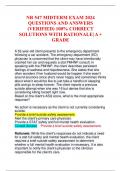NR 547 MIDTERM EXAM 2024 QUESTIONS AND ANSWERS (VERIFIED) 100% CORRECT SOLUTIONS WITH RATIONALE| A + GRADE A 52-year-old client presents to the emergency department following a car accident. The emergency department (ED) physician is concerned that the client may have intentionally crashed her car and requests a stat PMHNP consult. In speaking with the PMHNP, the client describes persistent feelings of sadness and hopelessness. She states that she often wonders if her husband would be happier if she was n't around anymore since she's never happy and sometimes thinks about what it would be like to just take a handful of sleeping pills and go to sleep forever. The client reports a previous suicide attempt when she was 16 but denies that she is considering k illing herself right now. Based on the client's ASQ score, what is the most appropriate response? No action is necessary as the client is not currently considering suicide. Provide a brief suicide safety assessment. Alert the client's primary care physic ian. Provide a STAT safety and full mental health evaluation. Correct Answer Provide a brief suicide safety assessment . Rationale: While the client's responses do not indicate a need for a stat full safety and mental health evaluation, the client requires a brief suicide safety assessment to determine whether a full mental health evaluation in necessary. It is also important to notify the client's physician or the clinician responsible for the client's care. Diagnostic Testing when diagnosing ment al health disorders Correct Answer -Diagnostic tests and labs are most used to rule out physical conditions that may cause psychiatric symptoms and to evaluate the effects of treatment Basic Laboratory Interpretation Correct Answer Complete Blood Count Comprehensive Metabolic Panel (CMP) Thyroid Function Tests Vitamin B12 Level Vitamin D Level Toxicology Screen Urinalysis (UA) Basic Laboratory Interpretation: Complete Blood Count Correct Answer -measures RBCs, WBCs, hemog lobin, hematocrit, and platelets -includes a differential of the WBCs -In mental health, the CBC is used to rule out medical conditions that may present with symptoms that can be attributed to both medical and psychiatric diagnoses • Ex: rule out anemia as a cause for depressive symptoms and fatigue • Ex: rule out infection as a cause of acute mental status changes RBCs: 4.5 -6.0 million/microliter Hemoglobin: 12 -18 grams/100 mL Hematocrit: 38% -48% Reticulocytes: 0% -1.5% WBCs (total): 5000 -10,000/microliter Neutrophils: 55% -70% Eosinophils: 1% -3% Basophils: 0.5% -1% Lymphocytes: 20% -35% Monocytes: 3% -8% Platelets: 150,000 -300,000/microliter Basic Laboratory Interpretation: Comprehensive Metabolic Panel (CMP) Correct Answer common blood test used to determine general health status -fluid and electrolyte balance, status of the body's metabolism, liver function, and kidney function -used to monitor the effects of medications, such as antipsychotics, on liver function and glucose levels -rule out medical conditions that could cause symptoms • Ex: changes in mood or cognition Sodium (Na+): 136 -145 mEq/L Postassium (K+): 3.5 -5.0 mEq/L Chloride (Cl -): 95-105 mEq/L Bicarbonate (HCO3 -): 22-28 mEq/L Calcium, serum (Ca 2+) 8.4 -10.2 mg/dl Glucose, serum Fasting: 70 -110 mg/dl; 2 -h postprandial: <120mg/dl Cholesterol, serum: REC<200 mg/dl Total Protein 6.0 -7.8 g/dl Albumin 3.5 -5.5 g/dl -Kidney Tests • Creatinine, serum 0.6 -1.2mg/dl • Urea nitrogen, serum (BUN) 7 -18mg/dl -Liver Tests • Alanine aminotransferase (ALT), serum: 8 -20 U/L • Aspartate aminotransferase (AST), serum: 8 -20 U/L • Bilirubin, serum (adult) Total//Direct: 0.1 -1.0 mg/dl // 0.0 -0.3 mg/dl • Phosphatase (alkaline), serum: 20 -70 U/L Basic Laboratory Interpretation: Thyr oid Function Tests (TFTs) Correct Answer used to rule out thyroid disorders as a cause for symptoms • symptoms related to thyroid disorders include anxiety, restlessness, depression, mood swings, sleeping difficulties, difficulties with concentratio n, short -term memory lapses, and lack of mental alertness Normal TFT levels TSH: 0.4 -4.5 mIU/L T3: 100 -200 ng/dL T4: 5 -11 ug/dL Basic Laboratory Interpretation: Vitamin B12 Level Correct Answer Deficiency of vitamin B12 can affect mood and other brain functions -psychiatric symptoms associated with B12 deficiency include depression, mania, psychotic symptoms, and cognitive impairment normal: 190 -950 picograms/mL • 200 -300/mL indicates a bord erline level with a possible need for additional testing Basic Laboratory Interpretation: Vitamin D Level Correct Answer affects functions such as neurotransmission, neuroprotection, & neuroimmunomodulation -high prevalence of vitamin D deficiency in clients with psychiatric disorders such as schizophrenia, depression, seasonal affective disorder, and cognitive impairment -Symptoms of vitamin D deficiency include depression, irritability, anxiety, psychosis, and poor brain development 25-hydroxy vi tamin D blood test: normal 20 -50 ng/mL, less than 12 ng/mL indicates a deficiency Basic Laboratory Interpretation: Toxicology Screen Correct Answer -rule out substance use as a cause for symptoms -used before starting therapy involving controlled s ubstances -used to monitor medication adherence -used in the diagnosis of substance use disorder




